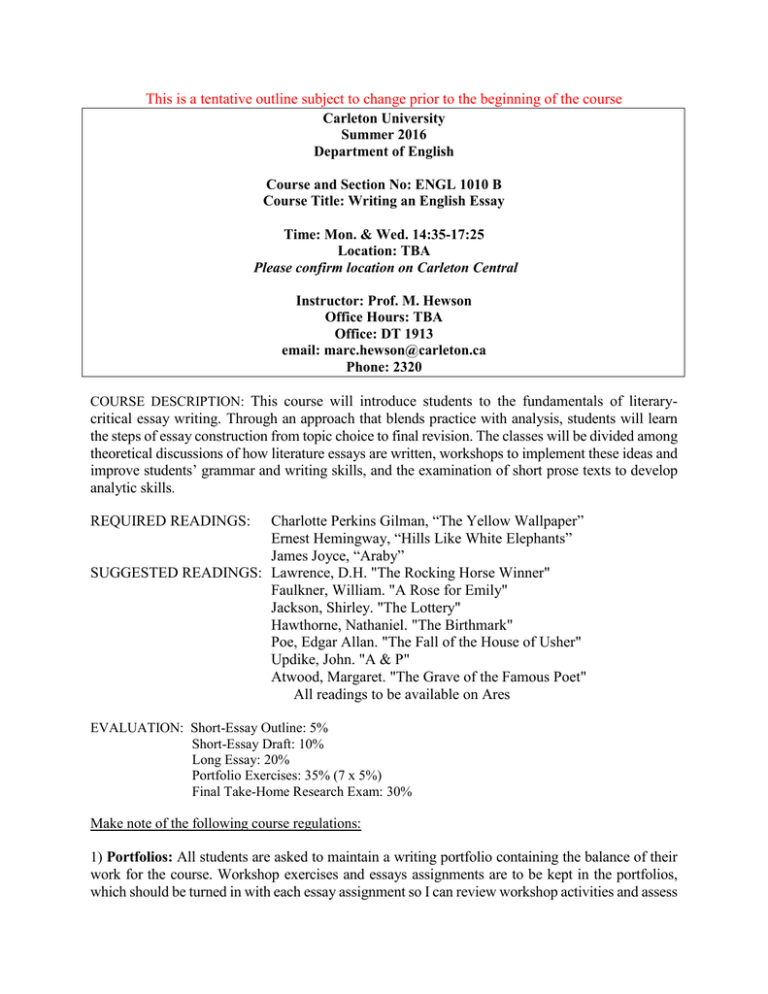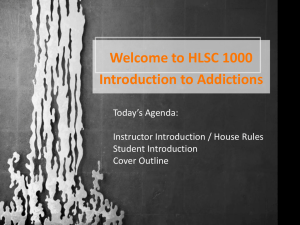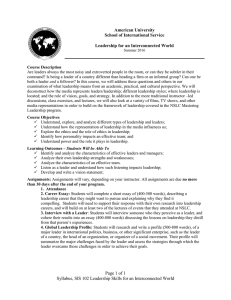ENGL 1010: Writing an English Essay - Carleton Syllabus
advertisement

This is a tentative outline subject to change prior to the beginning of the course Carleton University Summer 2016 Department of English Course and Section No: ENGL 1010 B Course Title: Writing an English Essay Time: Mon. & Wed. 14:35-17:25 Location: TBA Please confirm location on Carleton Central Instructor: Prof. M. Hewson Office Hours: TBA Office: DT 1913 email: marc.hewson@carleton.ca Phone: 2320 COURSE DESCRIPTION: This course will introduce students to the fundamentals of literary- critical essay writing. Through an approach that blends practice with analysis, students will learn the steps of essay construction from topic choice to final revision. The classes will be divided among theoretical discussions of how literature essays are written, workshops to implement these ideas and improve students’ grammar and writing skills, and the examination of short prose texts to develop analytic skills. Charlotte Perkins Gilman, “The Yellow Wallpaper” Ernest Hemingway, “Hills Like White Elephants” James Joyce, “Araby” SUGGESTED READINGS: Lawrence, D.H. "The Rocking Horse Winner" Faulkner, William. "A Rose for Emily" Jackson, Shirley. "The Lottery" Hawthorne, Nathaniel. "The Birthmark" Poe, Edgar Allan. "The Fall of the House of Usher" Updike, John. "A & P" Atwood, Margaret. "The Grave of the Famous Poet" All readings to be available on Ares REQUIRED READINGS: EVALUATION: Short-Essay Outline: 5% Short-Essay Draft: 10% Long Essay: 20% Portfolio Exercises: 35% (7 x 5%) Final Take-Home Research Exam: 30% Make note of the following course regulations: 1) Portfolios: All students are asked to maintain a writing portfolio containing the balance of their work for the course. Workshop exercises and essays assignments are to be kept in the portfolios, which should be turned in with each essay assignment so I can review workshop activities and assess your progress through the term. PLEASE USE POCKET FOLDERS NOT 3-RING BINDERS OR DUO-TANGS. 2) Submissions: A) Essay assignments should be submitted at the beginning of the assigned class, or dropped off at the English Department drop box located outside 1812 Dunton Tower. Those assignments are date-stamped and put in my mailbox. Assignments are NOT to be slipped under my office door. Emailed or faxed assignments will not be accepted without prior written agreement of the professor. If one of your assignments is lost, misplaced, or not received by the instructor, you are responsible for having a backup copy that can be submitted immediately upon request; B) Workshop exercises are to be written and submitted in the class during which they are assigned. 2) Due Dates and Late Policies: A) Essay assignments submitted after the due date without accompanying medical or other appropriate documentation will be deducted 5% PER DAY, beginning 8:30am the day after the due date, to a maximum of 5 days (weekends counting as one day). After that, no undocumented late papers will be accepted. There will be no individual exemptions from or exceptions to this rule. If non-emergency situations develop, familiarize the professor with them BEFORE they occur whenever possible. Also, be aware that late essay assignments may not be marked in time for return with on-time papers, meaning students may not have time to implement advice and commentary for subsequent assignments; B) Workshop exercises will not be accepted after the assigned class without documentation to explain student absence. 3) Posted Grades: All assignment grades will be posted on the course’s cuLearn site. Standing in a course is determined by the course instructor subject to the approval of the Faculty Dean. This means that grades submitted by the instructor may be subject to revision. No grades are final until they have been approved by the Dean. 4) Plagiarism: The University Senate defines plagiarism as presenting, whether intentionally or not, the ideas, expression of ideas, or the work of others as one’s own. This can include: •reproducing or paraphrasing portions of someone else’s published or unpublished material, regardless of the source, and presenting these as one’s own without proper citation or reference to the original source •submitting a take-home examination, essay, laboratory report or other assignment written, in whole or in part, by someone else •using ideas, quotations, or paraphrased material, concepts or ideas without appropriate acknowledgement in an essay or assignment •failing to acknowledge sources through the use of proper citations when using another’s works, and/or failing to use quotation marks •handing in substantially the same piece of work for academic credit more than once without prior written permission of the course instructor in which the submission occurs Plagiarism is a form of intellectual theft. It is a serious offence that cannot be resolved directly with the course’s instructor. The Associate Deans of the Faculty conduct a rigorous investigation, including an interview with the student, when an instructor suspects a piece of work has been plagiarized. Penalties are not trivial. They can include failure of the assignment, failure of the entire course, suspension from a program, suspension from the university, or even expulsion from the university. You should familiarize yourself with the University’s Academic Integrity policy online at http://www2.carleton.ca/studentaffairs/ccms/wp-content/ccms-files/academic_integrity_policy.pdf. For more detailed discussion of the issue of plagiarism and proper use of sources, consult the following website: http://www.utoronto.ca/writing/plagsep.html. 5) Preparation & Attendance: While attendance will not be actively monitored, regular attendance at lectures is expected. Lecture notes or synopses will not be provided to students missing class—it is your responsibility to make up for missed work. Active participation is expected; this means being prepared to take notes, discuss readings and complete workshop exercises. 6) Communication: I will use email and the cuLearn course site to communicate with students; you are advised to check both regularly. You are encouraged to contact me through email using your connect accounts. Please indicate your concern in the subject line (e.g. “research question”); unidentified emails will be deleted. Excessive informality is discouraged. I check email once daily Monday to Friday (usually sometime in the morning) but NOT on weekends. This means last-minute emails concerning assignments or what-have-you will likely not be returned in time to clarify questions (particularly those sent later in the day on Fridays). 7) Classroom Etiquette: Students are expected to be on time for each class so as not to disrupt the lecture for other class members. Also any electronic activity is expected to be for note-taking purposes only; texting, surfing, “facebooking,” “tweeting” etc are rude and disruptive for all others in the classroom. Cell-phones and MP3 players should be turned off for the duration of lecture. Additionally, while discussion is encouraged, private conversations between students are distracting to those not involved; any comments should be made openly or not at all. ACCOMODATIONS You may need special arrangements to meet your academic obligations during the term. For an accommodation request the processes are as follows: 1) Pregnancy obligation: write to me with any requests for academic accommodation during the first two weeks of class, or as soon as possible after the need for accommodation is known to exist. For more details visit the Equity Services website: http://www.carleton.ca/equity/ 2) Religious obligation: write to me with any requests for academic accommodation during the first two weeks of class, or as soon as possible after the need for accommodation is known to exist. For more details visit the Equity Services website: http://www.carleton.ca/equity/ 3) Academic Accommodations for Students with Disabilities: The Paul Menton Centre for Students with Disabilities (PMC) provides services to students with Learning Disabilities (LD), psychiatric/mental health disabilities, Attention Deficit Hyperactivity Disorder (ADHD), Autism Spectrum Disorders (ASD), chronic medical conditions, and impairments in mobility, hearing, and vision. If you have a disability requiring academic accommodations in this course, please contact PMC at 613-520-6608 or pmc@carleton.ca for a formal evaluation. If you are already registered with the PMC, contact your PMC coordinator to send me your Letter of Accommodation at the beginning of the term, and no later than two weeks before the first in-class scheduled test or exam requiring accommodation (if applicable). After requesting accommodation from PMC, meet with me to ensure accommodation arrangements are made. Please consult the PMC website for the deadline to request accommodations for the formally-scheduled exam (if applicable) at http://www.carleton.ca/pmc/new-and-current-students/dates-and-deadlines/ A full syllabus including a full lecture schedule and assignment information will be available later in the spring


![Submission 68 [doc]](http://s3.studylib.net/store/data/008000926_1-fed8eecce2c352250fd5345b7293db49-300x300.png)

